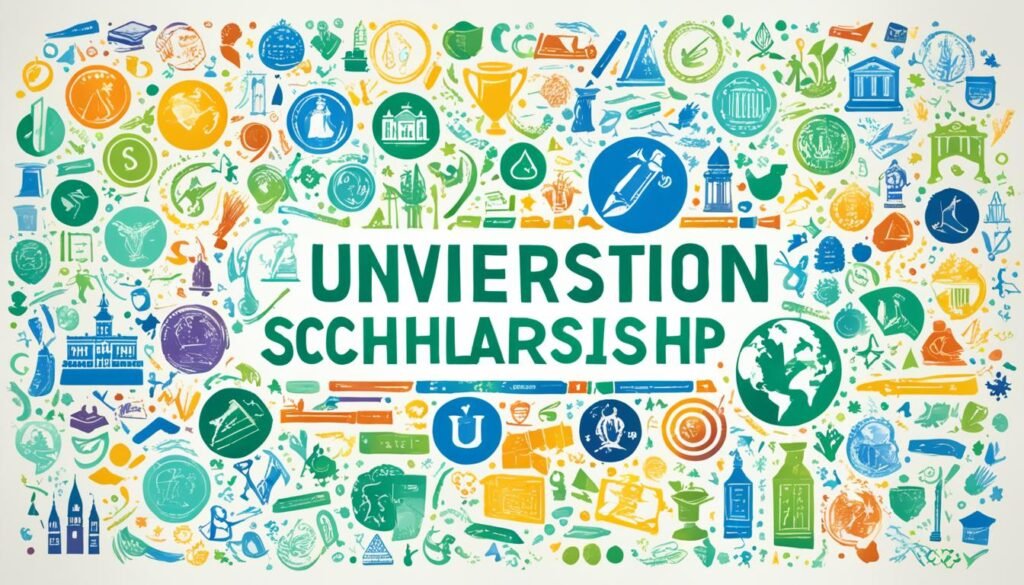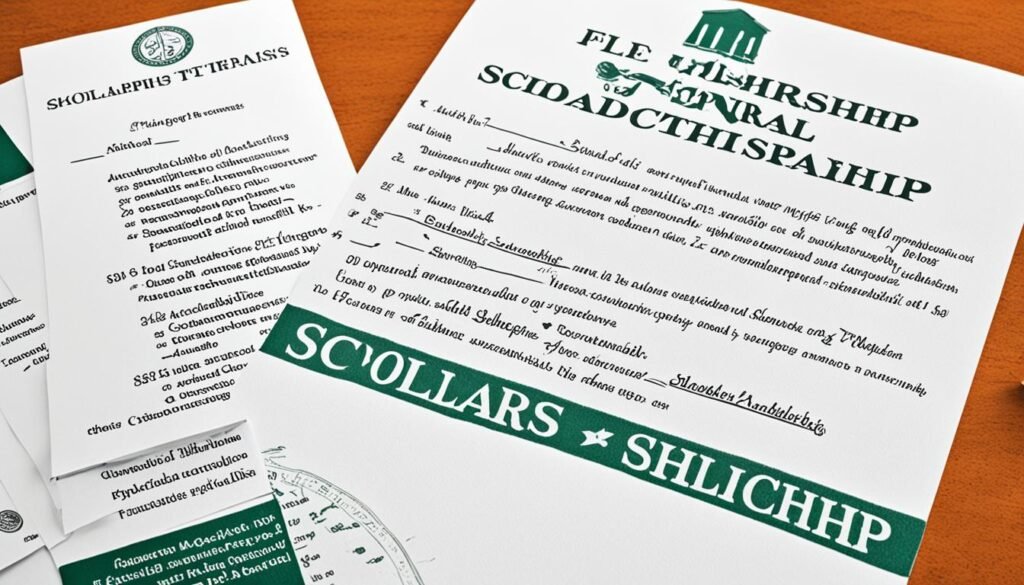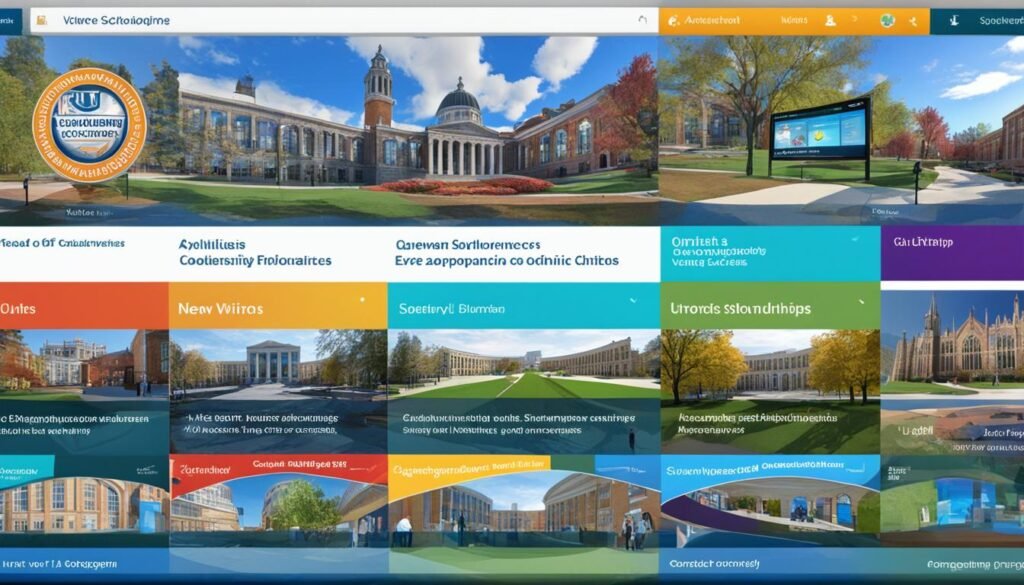College scholarships are one way to ensure that you don’t end up with crippling debt when you graduate. Scholarships can help reduce the overall cost of your college attendance and help you focus on your studies instead of working long hours to pay for tuition and other expenses. Receiving a scholarship can also be a great honor and boost your self-esteem among your peers.
Key Takeaways
- College scholarships can significantly reduce the financial burden of higher education.
- Scholarships allow students to focus more on their academic pursuits rather than working to cover expenses.
- Receiving a scholarship can be a prestigious honor that boosts a student’s self-confidence and recognition among peers.
- There are various types of scholarships available, including merit-based, need-based, and specialized awards.
- Proactively searching for and applying to scholarships can lead to substantial financial assistance for students.
Introduction to University Scholarships
As the cost of college tuition continues to rise, university scholarships have become an increasingly important way for students to access affordable education. Higher education is widely recognized as a valuable investment, but the cost of college can be a significant barrier, leading to concerns about student debt.
Importance of University Education
A university education provides numerous benefits, including improved career prospects, personal growth and development, and increased earning potential over a lifetime. However, the rising costs of tuition and living expenses can make it challenging for many families to afford a college education.
Rising Costs of College Tuition
The average cost of college tuition has been steadily increasing, making it increasingly difficult for many students to pay for their education. This has led to a growing reliance on student loans and concerns about the long-term impact of student debt.
Scholarships as a Solution
College scholarships can be a valuable solution to the problem of college affordability. By providing financial aid to students, scholarships can help make access to college more affordable and reduce the burden of student debt.
Types of University Scholarships

College scholarships come in a variety of forms, each designed to support students with different needs and qualifications. Two of the most common types are need-based scholarships and merit-based scholarships. Additionally, there are scholarships for community service and military service, which can provide valuable financial assistance to deserving students.
Need-Based Scholarships
Need-based scholarships are awarded to students based on their financial circumstances. These scholarships are intended to help cover the cost of tuition, fees, and other expenses for students from low-income or middle-income families who demonstrate a significant financial need. Eligibility for need-based scholarships is typically determined by factors such as the applicant’s household income, assets, and the size of their family.
Merit-Based Scholarships
Merit-based scholarships, on the other hand, are awarded to students based on their academic achievements, extracurricular activities, or other accomplishments. These scholarships recognize and reward students who have demonstrated exceptional talent, leadership, or dedication in their studies or community involvement. Eligibility for merit-based scholarships often depends on factors like grade point average (GPA), standardized test scores, and a demonstrated record of academic excellence or community service.
Community Service Scholarships
Community service scholarships are designed to encourage and support students who have made significant contributions to their local communities through volunteer work, advocacy, or other forms of service. These scholarships are often awarded to students who have demonstrated a commitment to making a positive impact on their communities, whether through organized programs or individual initiatives.
Military Service Scholarships
Military service scholarships are available to students who have served or are currently serving in the armed forces, as well as to their dependents. These scholarships recognize the sacrifices and contributions of military personnel and their families, and they can help offset the cost of a college education for those who have served their country.
Benefits of University Scholarships

Securing a university scholarship can provide numerous benefits beyond just the financial aspect. These advantages can have a profound impact on a student’s overall academic success, personal growth, and future opportunities.
Reduced Financial Burden
One of the primary benefits of university scholarships is the financial aid they provide. Scholarships can significantly reduce the cost of tuition and other college-related expenses, allowing students to focus more on their academic success rather than the constant worry of financing their education. This can lead to greater student engagement and improved graduation rates.
Improved Academic Focus
With the financial burden alleviated, scholarship recipients can dedicate more time and energy to their studies without the need to work long hours to cover tuition assistance and other costs. This enhanced academic focus can translate into higher grades, better retention rates, and overall academic achievement.
Boost in Self-Esteem and Recognition
Receiving a university scholarship is a significant honor that can provide a tremendous boost to a student’s self-esteem and sense of recognition. This recognition can foster a greater sense of belonging and engagement within the campus community, further enhancing the student’s college experience and future prospects.
Merit-Based vs. Need-Based Scholarships

When it comes to university scholarships, there are two primary types: merit-based and need-based. Understanding the differences between these two categories can help students identify and apply for the scholarships most suitable for their individual circumstances.
Merit-Based Scholarships: Academic Achievement
Merit-based scholarships are awarded based on a student’s academic achievement, such as their grade point average (GPA), standardized test scores, or other academic accomplishments. These scholarships are designed to recognize and reward exceptional academic performance, often without consideration of the student’s financial situation. Merit-based scholarships can provide valuable financial support to high-achieving students, enabling them to focus on their studies rather than worrying about the cost of tuition and other expenses.
Need-Based Scholarships: Financial Need
In contrast, need-based scholarships are awarded based on a student’s financial needs. These scholarships are intended to assist students from low-income or underprivileged backgrounds, helping to make higher education more accessible and affordable. Eligibility for need-based scholarships is typically determined by the information provided in the Free Application for Federal Student Aid (FAFSA), which assesses a student’s and their family’s financial resources.
Competitiveness and Availability
The competitiveness and availability of both merit-based and need-based scholarships can vary widely. Merit-based scholarships are often highly competitive, as they are awarded to students who demonstrate exceptional academic abilities. Need-based scholarships, on the other hand, may be more widely available, but the total amount of funding may be limited. Students should research and explore all scholarship opportunities, both merit-based and need-based, to maximize their chances of securing the financial support they need to pursue their educational goals.
Federal vs. Private Scholarships

College scholarships are generally categorized into two main types: federal and private. Federal scholarships are awarded by the government and are typically based on financial need, offering a valuable source of government-funded financial aid for students. On the other hand, private scholarships are awarded by organizations, companies, and individuals, and can be based on a variety of factors, from merit to financial need to a special talent or interest.
Federal Scholarships: Government-Funded
Federal scholarships are a form of financial aid provided by the U.S. government to help students with the cost of their education. These government-funded scholarships are often awarded based on a student’s financial need, as determined by the Free Application for Federal Student Aid (FAFSA). By filling out the FAFSA, students can access a range of federal student aid options, including scholarships, grants, and loans.
Private Scholarships: Organizations and Individuals
Private scholarships are awarded by a variety of organizations, companies, and individuals, rather than the government. These organization scholarships and individual scholarships can be based on a wide range of criteria, such as academic achievement, community service, athletic ability, or specific hobbies or interests. Private scholarships can be a valuable source of external funding for students to help cover the cost of their education.
Application Processes and Eligibility
The application process and eligibility requirements for federal and private scholarships can vary significantly. Federal scholarships often require the completion of the FAFSA, while private scholarships may have their own unique application requirements, such as essays, letters of recommendation, or auditions. It’s important for students to carefully research the specific student resources and financial aid opportunities available to them to maximize their chances of securing the necessary funding for their college education.
Tips for Finding Credible Scholarships

When it comes to securing college funding, the search for eligible scholarships can feel daunting. However, by employing a few key strategies, you can uncover a wealth of scholarship search tips and resources to help you finance your education. Let’s explore some effective approaches to finding credible scholarships.
Search for Field-Specific Scholarships
One of the best ways to start your scholarship search is by looking for opportunities that are tailored to your specific field of study or area of interest. These field-specific scholarships are often less competitive and can provide a great source of targeted funding. Take the time to research scholarships related to your major, extracurricular activities, or unique talents and experiences.
Explore Local Business and Community Scholarships
In addition to national and university-level scholarships, don’t overlook the wealth of local scholarships offered by businesses, organizations, and community groups in your area. These community scholarships can be an excellent source of funding, as they tend to have fewer applicants and more flexible eligibility requirements.
Check with Your School’s Financial Aid Office
Your school’s financial aid office can be an invaluable resource when it comes to finding and applying for scholarships. They often have extensive knowledge of the available scholarship resources and can provide guidance on the scholarship research and application process. Be sure to connect with them early and often to ensure you don’t miss out on any scholarship eligibility opportunities.
University Scholarships

Colleges and universities in the United States offer a diverse array of scholarship programs to attract and retain talented students. These scholarship opportunities can be categorized into three main types: merit-based scholarships, need-based scholarships, and scholarships for underrepresented groups.
Merit-Based University Scholarships
Merit-based scholarships are awarded to students based on their exceptional academic achievements, such as high grade point averages, outstanding test scores, or impressive extracurricular accomplishments. These scholarships recognize and reward the hard work and dedication of university scholars who have demonstrated their academic prowess.
Need-Based University Scholarships
On the other hand, need-based scholarships are designed to provide financial assistance to students from economically disadvantaged backgrounds. These scholarships aim to make a university education more accessible and affordable for students who have a genuine financial need, ensuring that all qualified individuals have the opportunity to pursue their academic dreams.
University Scholarships for Underrepresented Groups
In an effort to promote diversity and inclusion on college campuses, many universities also offer scholarships specifically targeted at underrepresented groups, such as racial minorities, first-generation college students, or individuals with disabilities. These scholarships not only support the academic success of these students but also contribute to the overall diversity and inclusivity of the student body, which can enhance the educational experience for all.
By offering a diverse range of scholarship opportunities, colleges and universities can effectively attract and retain a highly talented and diverse student population, ultimately supporting student recruitment and student retention efforts.
Online Scholarship Applications

When applying for scholarships online, there are several key steps to consider. From creating a comprehensive scholarship profile to strategically searching and filtering through available opportunities, the process requires organization, attention to detail, and a proactive approach.
Creating a Scholarship Profile
Start by establishing a robust scholarship profile on various websites. This typically involves filling out basic information about your educational background, academic achievements, extracurricular activities, and future goals. Building these detailed profiles can help scholarship search engines match you with relevant organization scholarships and individual scholarships.
Searching and Filtering Scholarships
With your profile in place, you can then utilize powerful scholarship filters to identify online scholarship applications that align with your qualifications and interests. Many scholarship platforms offer advanced search tools that allow you to narrow down options by criteria such as field of study, demographic, financial need, and more.
Following Application Instructions
Once you’ve discovered promising scholarship opportunities, it’s crucial to carefully read and follow all application instructions. This may involve submitting transcripts, letters of recommendation, essays, or other supplementary materials. Attention to detail is key to ensuring a successful application process.
Submitting Applications Before Deadlines
Finally, be sure to submit your scholarship applications well before the application deadlines. Many scholarship resources and external funding sources have strict deadlines, so staying organized and meeting these timeframes is essential for consideration.
Scholarship Essay Writing Tips
Crafting a compelling scholarship essay is a critical component of the application process. While scholarship essays provide an opportunity to share your personal story, it’s essential to ensure that you directly address the essay prompt before delving into the details. Successful scholarship recipients, such as Peggins and Kalter, have emphasized the importance of answering the question at hand rather than worrying excessively about the essay portion.
Answering the Essay Prompt
When approaching a scholarship essay, it’s crucial to carefully read and understand the prompt. Ensure that your response directly addresses the specific question or requirements outlined in the prompt. By staying focused on the prompt, you can demonstrate your ability to follow instructions and provide a cohesive, relevant response that showcases your qualifications.
Telling a Compelling Story
While scholarship essays are an opportunity to share your personal narrative, it’s important to strike a balance between storytelling and addressing the essay prompt. Craft a compelling story that highlights your unique experiences, achievements, and aspirations, but always ensure that your narrative is directly tied to the essay question. This will help the scholarship committee understand how your experiences and qualities make you a deserving candidate.
Revising and Repurposing Essays
Effective scholarship essay writing often involves multiple rounds of revision and repurposing. After drafting your initial essay, carefully review and refine your work to ensure it is well-written, compelling, and tailored to the specific scholarship. Additionally, consider repurposing elements of your essay for other scholarship applications, as this can streamline the application process and demonstrate your dedication to securing financial support for your education.
Also Read: 10 Best Universities In The World For Scholarships
Conclusion
University scholarships offer invaluable benefits beyond just financial aid. They serve as catalysts for academic excellence, empowering students to pursue their educational aspirations without the burden of excessive debt. Moreover, scholarships foster a sense of community and belonging within universities, as recipients often engage in mentorship and leadership roles, contributing positively to campus life. These awards also open doors to unique opportunities such as internships, research projects, and networking events, enhancing students’ professional development and career prospects. Additionally, scholarships promote diversity and inclusivity by supporting students from various backgrounds and fostering a more equitable educational environment. Ultimately, the secret advantages of university scholarships extend far beyond their monetary value, enriching the academic experience and empowering individuals to reach their fullest potential.
FAQs
Q: What are the different types of scholarships available at University XYZ?
A: University XYZ offers a range of scholarships to incoming, transfer, first-year, and current students. These scholarships include merit scholarships, foundation scholarships, departmental scholarships, and external scholarships.
Q: How can I apply for a general scholarship at University XYZ?
A: To apply for a general scholarship at University XYZ, students must complete the online application and submit any required documents to the Office of Financial Aid. Scholarships are awarded based on various criteria such as academic merit, financial need, and extracurricular involvement.
Q: Are incoming students automatically considered for scholarships at University XYZ?
A: Yes, incoming students at University XYZ are automatically considered for scholarships based on their application for admission. Merit-based scholarships and other types of financial aid are included in the student’s financial aid package.
Q: What scholarships are available for transfer students at University XYZ?
A: University XYZ offers scholarships specifically for transfer students, including transfer scholarships, foundation scholarships, and departmental scholarships. Transfer students may also be eligible for external scholarships.
Q: How can first-year students at University XYZ find a list of scholarships they are eligible for?
A: First-year students at University XYZ can visit the Office of Financial Aid website to access a list of scholarships available to them. This list includes scholarships that are awarded based on academic achievement, financial need, and other criteria.
Q: Does University XYZ offer scholarships for deserving students?
A: Yes, University XYZ offers scholarships for deserving students based on various criteria such as academic achievement, leadership qualities, community involvement, and financial need. These scholarships aim to support students who demonstrate exceptional merit.
Q: What financial aid options are available for current students at University XYZ?
A: Current students at University XYZ may be eligible for departmental scholarships, foundation scholarships, and external scholarships. Additionally, the Office of Financial Aid provides ongoing support and resources to help current students secure financial assistance.
